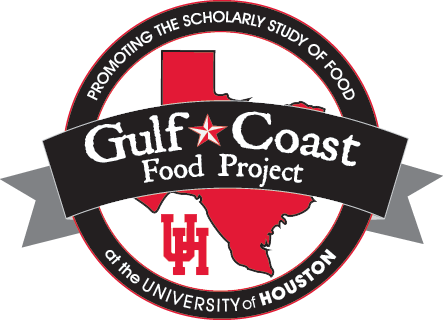
What is the Gulf Coast Food Project?
Founded within the Center for Public History (CPH) in 2008, the Gulf Coast Food Project (GCFP) brings food studies research and creative endeavors into the classroom and community. The GCFP already has an outstanding record of developing classes, research projects, and documentary films that draw inspiration from the region’s tremendous diversity and cultural vibrancy. This work has resulted in high-profile grants, including a $100,000 grant from the National Endowment for the Humanities (NEH) and an $8,000 grant from the Knight Foundation. Today, the Gulf Coast Food Project is well positioned to build on this success. The University of Houston is an ideal home for a high-profile Food Institute dedicated to community outreach, innovative teaching, and cutting edge research focusing on the study and promotion of the unique food culture of our city and region. A Carnegie-designated Tier One research university and leader in the fields of Health, Arts, and Energy, UH enrolls over 38,000 students, comprising the second most diverse student body in the nation.
Why Study Food on the Gulf Coast?
Our unique geographic location and relation to multiple points of food production, distribution, and consumption afford us an ideal laboratory for teaching, researching and producing documentary films on foodways. Texas ranks second nationally for total agricultural output, is the leader in cattle production, and produces 68 percent of the nation’s shrimp—more than Mississippi, Alabama, and Florida combined. Houston is also the fourth most populous city in the nation and is now the most diverse large metropolitan area in the United States with immigrants from all over the world continuing to bring their food to the growing region. As John T. Edge, Director of the Southern Foodways Alliance recently wrote in the Oxford American, Houston has “emerge[d] as the South’s twenty-first century Creole capitol, where Vietnamese pho is as beloved as Cajun gumbo and tandoor-cooked naan smeared with chutney rivals skillet cooked corn bread smeared with butter.” He celebrates a dynamism that flows from the region’s history of race, migration, economy, and culture, identifying a rich field of study and area for creative endeavors.
So what does this all mean?
It means we’re really passionate about food and think it is something that deserves serious study and attention. Among this incredible diversity found within Houston, there is a commonality found within food as the act of preparing, cooking, and sharing food is a fundamental act that transcends culture. Through these projects, we hope to celebrate our diversity while recognizing our common humanity.
Co-Directors of the GCFP



Dr. Temple Northup
Email: temple@uh.edu
Phone: (713) 743-1697
Temple Northup received his B.A. from Wake Forest University, M.A. from Syracuse University, and Ph.D. from the University of North Carolina, Chapel Hill.
Dr. Monica Perales
Email: mperales3@uh.edu
Phone: (713) 743-3103
Monica Perales received her B.A. and M.A. from the University of Texas at El Paso, and her Ph.D. from Stanford University.
Dr. Todd Romero
Email: tromero2@uh.edu
Phone: (713) 743-3112
Todd Romero received his BA from the University of Colorado at Boulder and his MA and Ph.D. from Boston College.
Affiliated Faculty of the GCFP










Dr. Mark Goldberg
Email: magoldberg@uh.edu
Phone: (713) 743-3091
Dr. Tracy Ledoux
Email: taledoux@uh.edu
Phone: (713) 743-1870
Dr. Natalia Milanesio
Email: nmilanesio@uh.edu
Phone: (713) 743-3113
Dr. James Schafer
Email: jschafer@uh.edu
Phone: (713) 743-3119
Dr. Mark Young
Email: markyoung@uh.edu
Phone: (713) 743-5278
Sponsors and Supporters
The Gulf Coast Food Project is made possible by the generous support of those both within and outside of the University of Houston. In particular, the following groups have contributed greatly to the development of the project:
Within the University of Houston, the GCFP is housed with the Center for Public History. It is also supported by the Jack J. Valenti School of Communication. Both the Center for Public History and the Valenti School of Communication are housed with the broader College of Liberal Arts and Social Sciences.
Outside of the University of Houston, the GCFP has found support in a number of generous corporations, including the National Endowment for the Humanities (NEH), Foodways Texas, El Paso Lecture Series, The Knight Foundation, the Association for Education in Journalism and Mass Communication, and Humanities Texas.








